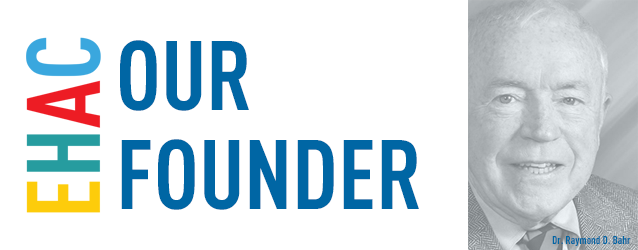EHAC Letter: A Message from Dr. Bahr

A Heartfelt Message
I write this letter with the hope that I can help you gain some of the insight that I have learned after many years of working with heart attack patients. I offer you this take-home message: Heart attacks do not have to kill, and heart attacks do not have to destroy heart muscle. They do so only because you and I allow this to happen. It is important for you to understand this because, having done so, the next step is to be proactive in helping to correct the problem.
The heart is a tremendous pump. I say that because it has tremendous reserve capacity. It can pump 5 to 50 liters per minute, allowing you to do whatever is physically necessary to meet your needs and demands, whether it be sitting on the couch or running a marathon. To do this, the heart muscle needs nourishment. Three heart vessels are given the task of delivering oxygen and nutrients to the heart muscle. It is only when one or more of these vessels are blocked that this reserve capacity and the ability to function normally are compromised.
I could tell you about cholesterol, hypertension, and cigarette smoking and how controlling these risk factors can prevent the development of blockage within these vessels. But I want to emphasize that it is very important for you to understand when something is going wrong or when something happening within your body feels unusual to you, act quickly. A major blockage does not occur instantly; instead a vessel clogs over time. It is during this period of time that you have to be sensitive to subtle changes in your body. These changes are the early signs and symptoms of a heart attack. It is during this "grace period" that you must take action so that damage can be averted with lifestyle changes and cardio-protective medications, followed by diagnostic tests to determine the problem.
Prevention is a key word in medicine, and prevention of a heart attack is possible when you act quickly during the time that symptoms are minimal. About half of all heart attacks are preventable in that there are telltale signs that a heart attack is on its way. Patients may not go to the emergency room because they felt their pain was't severe enough to seek help; they may have felt just chest pressure, chest fullness, chest ache, chest burning, or other atypical symptoms. We should learn from these patients that heart attacks have beginnings, and early intervention can actually prevent heart attacks from taking place.
In many cases, the chest discomfort comes and goes, causing patients or those nearby to ignore the early signs and symptoms. Patients don't feel it is enough of an emergency to call 911, or first responders don't act because they are busy and feel that taking time would interfere with their schedule. Ignoring the early signs and symptoms makes these individuals enablers of the heart attack, rather than caregivers.
Please know what heart attacks are all about. Be attuned to yourself and become an early heart attack caregiver to yourself and your loved ones. It is with this thought in mind that I ask you to take this pledge that commits you to action when you or someone in your presence has the early warning signs of a heart attack. All who take this pledge can form a network that will one day reduce heart attacks from being the number one health problem in our nation.
Sincerely,
Raymond D. Bahr, M.D.